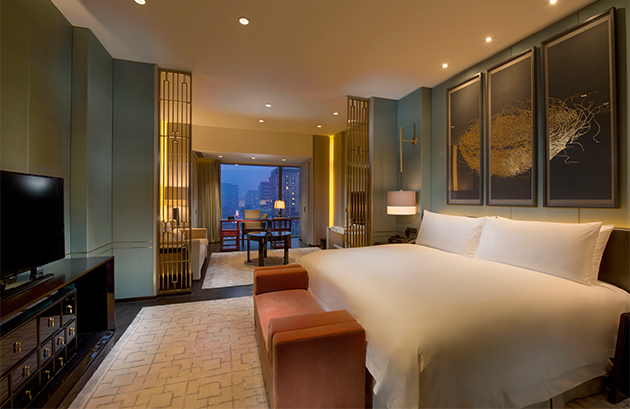The hotel building boom in China is showing no sign of slowing down. From mid-range to luxury, hotels are throwing open their doors up, down, and across China. Today, we’re focusing on two major hotels opening in Beijing, China’s historically and culturally rich capital city.
Just across from Forbes Travel Guide Four-Star The Peninsula Beijing, the city’s new Waldorf Astoria has the same prime location. Within the hotel are a seven-room spa, 24-hour business and fitness centers, and a toasty indoor pool. The nine-floor property is a stone’s throw from Wangfujing Street and walking distance from Tiananmen Square and the Forbidden City. Its 121 rooms and 55 suites, which start from around 484 square feet, include a number with terraces, providing you with a private vantage point from which to engage in China’s favorite pastime — people watching. In-room amenities include WiFi, LCD televisions, Nespresso coffee and Salvatore Ferragamo products.
Waldorf Astoria Beijing is right across the street from fusion Peking duck restaurant Duck de Chine, but the hotel also boasts three restaurants of its own — Brasserie 1893, Peacock Alley, and Zijin Mansion. All-day-dining restaurant Brasserie 1893 is styled after the Forbes Travel Guide Four-Star Waldorf Astoria New York’s brasserie; the 90-seat restaurant, which also has an eight-seat chef’s table, features a gleaming show kitchen and serves breakfast, lunch, and dinner. At Chinese restaurant Zijin Mansion, which serves Cantonese cuisine with a few Beijing favorites, the focus is on private dining; there are five private dining rooms, the largest of which can accommodate up to 24 people. The main dining room seats 50. Peacock Alley, the Waldorf’s signature lounge bar, serves light bites, drinks, and afternoon tea. Opening April 2014.
Texas-based Rosewood Hotels & Resorts is making its inaugural foray into China with its Beijing hotel, due to open this summer. Across from the Rem Koolhaas-designed China Central Television tower, the 22-story hotel, its exterior made up of bluestone from Mongolia, rises from Beijing’s concrete like a mountain — and that’s intentional; Rosewood Beijing’s design was inspired by traditional Chinese landscape paintings.
The hotel’s collection of artwork showcases pieces by local Chinese artists, too. In the entryway and reception area are recycled bronze tiles molded by Beijing artisans. The lobby, hung with artwork inspired by traditional mountain landscape paintings, features gorgeous works of calligraphy that pay homage to Qi Baishi’s 1946 ink painting A Long Life, a Peaceful World; the piece itself sold at auction in 2011 for $65 million. Within the 283 guest rooms are prints and cloisonné paintings that feature traditional Chinese symbols such as the dragon, among the most auspicious of Zodiac signs. Rooms, which start from around 538 square feet, are meant to feel more like luxury pieds-à-terre rather than standard hotel rooms. Plus, window seats allow you to soak in the expansive view from a comfortable, private perch.
Rosewood Beijing will have six restaurants, including The House of Dynasties, serving Chinese food and, with suites up to roughly 1,184 square feet, devoted entirely to private dining. Breakfast, lunch, and dinner are served at Bistrot B; from the open kitchen come a cornucopia of continental and Asian-inspired dishes, with kid-friendly options and an extensive wine list for adults. When you’ve ticked off everything on your list of Beijing’s must-see sights, take a breather at the hotel’s Sense Spa — whose five suites are specially designed for overnight stays — or in the indoor pool, gym, or yoga studio. Opening Summer 2014.
Photo Courtesy of Waldorf Astoria Beijing

